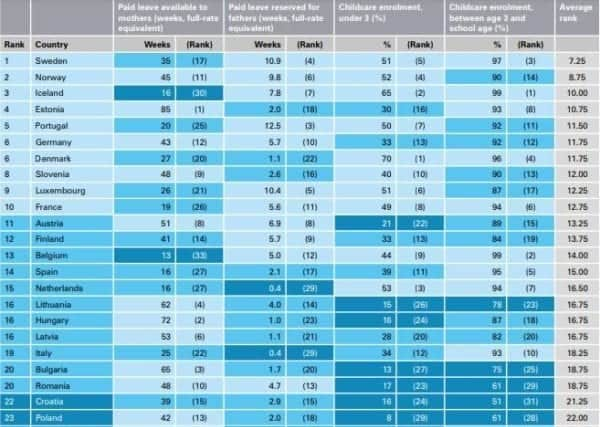This is how maternity and paternity leaves around Europe compare


The UK is one of the worst places in Europe for paid parental leave and finding affordable quality childcare, the UN children’s charity has said.
UNICEF researchers analysed countries according to the length of maternity and paternity leave, as well as the proportion of children between zero and six years old in childcare.
Advertisement
Hide AdAdvertisement
Hide AdThe only European countries lower than the UK were Cyprus, Switzerland and Greece. Ireland was one place above the UK.


The top ranked countries were Sweden, Norway and Iceland.
The full European list
The full UNICEF list of how different European countries rank for parents with young children. (Photo: UNICEF)
The poorest leave allowances
According to the research, mothers in the UK are only entitled to the equivalent of 12 weeks fully paid leave, while fully paid paternity leave is just 0.4 weeks.
Twenty nine per cent of UK children are in childcare between the ages of zero and three, and this rises to 73 per cent for children between the ages of three and six.
Advertisement
Hide AdAdvertisement
Hide AdOf the countries which rank below the UK, Switzerland - which is bottom of the list - offers the shortest fully paid maternity and paternity leave. Mothers get just eight weeks, while fathers are entitled to nothing.
In Switzerland, 30 per cent of under-threes are in child care, and 66 percent of pre-school children over three.
The most generous leave allowances
Meanwhile Sweden and Norway, which topped the leave rankings, allow women 35 and 45 weeks fully paid maternity respectively, as well as around 10 weeks paternity each.
And in both countries, more than half of children under three, and nearly all between three and six, are in quality child care.
Advertisement
Hide AdAdvertisement
Hide AdAnd although Estonia was fourth on the list overall, it topped the rankings for maternity leave. Estonian women are entitled to a massive 85 weeks full payment during maternity leave.
Cost of childcare puts people off
UK parents were among the most likely to say that cost was the reason that they chose not to use childcare.
The report was part of the UNICEF’s Early Moments Matter campaign, which aims to influence government and private sector policies to help families bring up children. It said that the research highlighted how parents in the UK faced challenged is balancing their work and care-giving responsibilities.
UNICEF said that Family-friendly policies strengthen the bond between parents and their children, which is critical for the development of families and socially cohesive societies.
Advertisement
Hide AdAdvertisement
Hide AdThe charity also advocates for at least six months of paid leave for parents, and for universal access to quality, affordable childcare from birth to children’s entry into the first year of school.
Should the government help?
“There is no time more critical to children’s brain development – and therefore their futures – than the earliest years of life,” said UNICEF Executive Director Henrietta Fore.
“We need governments to help provide parents with the support they need to create a nurturing environment for their young children. And we need the support and influence of the private sector to make this happen.”